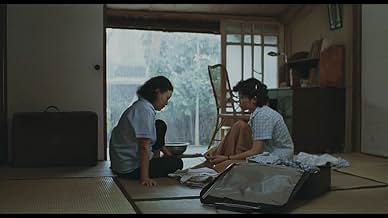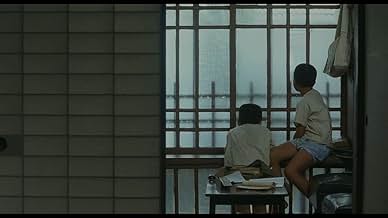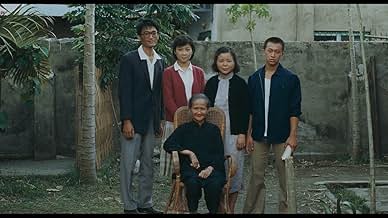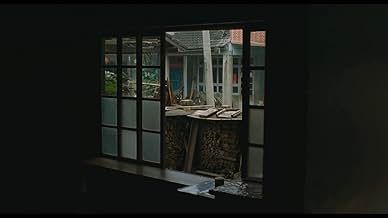CALIFICACIÓN DE IMDb
7.5/10
3.8 k
TU CALIFICACIÓN
Agrega una trama en tu idiomaThe semi-autobiographical film on director Hou Hsiao-Hsien's childhood and adolescence, when he was growing up in Taiwan, living through the deaths of his father, mother and grandmother.The semi-autobiographical film on director Hou Hsiao-Hsien's childhood and adolescence, when he was growing up in Taiwan, living through the deaths of his father, mother and grandmother.The semi-autobiographical film on director Hou Hsiao-Hsien's childhood and adolescence, when he was growing up in Taiwan, living through the deaths of his father, mother and grandmother.
- Dirección
- Guionistas
- Elenco
- Premios
- 8 premios ganados y 5 nominaciones en total
- Dirección
- Guionistas
- Todo el elenco y el equipo
- Producción, taquilla y más en IMDbPro
Opiniones destacadas
Although I think The Puppetmaster is the real best masterpiece of Hao, Time to live and the time to die is the one I love most. Despite the implication and background of Taiwan history in the film, as I am not so clear about it and not close to me, the story about growing-up is the reason that the film move me so much. The trip of the main kid "ar Ha" and his grandma become the warmest and most unforgettable part of the film. By the way, I think the relatively slow and quiet style of Hao extremely suit the story of rural and history background, much better than modern city background.
Very good movie in every aspect: acting, performance, cutting, quality of images, and plot. This is based on the true memories of the life of the director growing up in Taiwan. We follow this evolution in this movie in such realistic and natural images and scenes that we forget we are watching a movie and it looks like if we were watching real life scenes through someone's window. The main plot tells the story of a young boy who is dealing with family and other issues as he grows up during a certain period in Taiwan's history. A fascinating movie. Good foreign arthouse movies are so underrated on imdb and I don't even know why. I guess this site is for popular movies only and top 250 is ridiculous.
10grapelli
Besides being a great film about an emerging new generation in Taiwan after the war, this film is also full of authentic atmosphere.
There is the Japanese style house the family lives in; Japanese sandals, nowadays still worn by some elder people. Ah-ha and his granny eating water ice after he passed the entrance exam for middle school - the ice machine with it's big wheel in the foreground. The only street lamp, the kids play under in the evenings; the games they play in the streets. The haircut of school children - boys three centimeters, girls three centimeters below their ears. Their school uniforms, some of them still the same in Fengshan today (believe me). Gangs fighting with water melon knifes and the little red police jeep.
The film is close to real everyday life in Taiwan at that time, although you won't find much of it there nowadays.
There is the Japanese style house the family lives in; Japanese sandals, nowadays still worn by some elder people. Ah-ha and his granny eating water ice after he passed the entrance exam for middle school - the ice machine with it's big wheel in the foreground. The only street lamp, the kids play under in the evenings; the games they play in the streets. The haircut of school children - boys three centimeters, girls three centimeters below their ears. Their school uniforms, some of them still the same in Fengshan today (believe me). Gangs fighting with water melon knifes and the little red police jeep.
The film is close to real everyday life in Taiwan at that time, although you won't find much of it there nowadays.
It's kinda weird and almost become universal, many of the screenplay writers and directors in Asian Pacific area, such as Taiwan, China, Japan, Korea, Thailand, Vietnam...seemed to never be able to grow out of their teenage syndrome and phobia of their young and immature romances and loves. The formulaic trend, if I tried to trace it back, most likely was from Japan, originally from their Manga, their anti-social young writers who never had the working experiences or social lives, stayed in their bedrooms, read animated Manga stories, then wrote about their own limited experience from their elementary school to their high school, retrospected their puppy loves to their classmates, boys or girls in their uniforms, timid, shy and reserved, didn't know how to express their love to their opposite gender.
Ho is just one of them, so typically unable to grow out of such remembrance of his teenage love loss and his inability to deal with those impotent situations again and again. It changed and narrowed his thinking, lifestyle and sexuality. His movies most were nostalgic to his teenage time, about the young and fruitless romances, the melancholy regrets, the failures of his romantic adventures in a tightly conservative society he grew up with. His and many other similar Taiwanese writers and directors are exactly like those Japanese and Korean counterparts, many of their products are about romances in uniforms and satchels, after-school encounters, or shyness during classes to each other. These kind of romances never lost their charm to their audiences in puberty, never failed in box office. But it narrowed and hurt their advances in literature and movie production since they couldn't and even refused to grow out it.
It's time for you guys to grow up, not just to grow out of it!
Ho is just one of them, so typically unable to grow out of such remembrance of his teenage love loss and his inability to deal with those impotent situations again and again. It changed and narrowed his thinking, lifestyle and sexuality. His movies most were nostalgic to his teenage time, about the young and fruitless romances, the melancholy regrets, the failures of his romantic adventures in a tightly conservative society he grew up with. His and many other similar Taiwanese writers and directors are exactly like those Japanese and Korean counterparts, many of their products are about romances in uniforms and satchels, after-school encounters, or shyness during classes to each other. These kind of romances never lost their charm to their audiences in puberty, never failed in box office. But it narrowed and hurt their advances in literature and movie production since they couldn't and even refused to grow out it.
It's time for you guys to grow up, not just to grow out of it!
This film, which first brought Hou and the Taiwanese New Wave to international attention, seems deceptively simple, like your run-of-the mill growing-up-humbly-in-a-third-world-country narrative: a young boy, whose family has been transplanted from China to Taiwan, faces a hard path to adulthood complete with neighborhood tussles and family deaths. But gradually its manner of telling draws you in: at first, events seem like fragmented vignettes, but are actually blended in a succession that has been described as `like watching clouds floating by.' His propensity towards graphically composed, image-driven storytelling recalls the styles of Ozu, Satyajit Ray and even Tarkovsky, but where Hou excels is in applying his style towards an examination on the nature of history. For my money, there has never been a filmmaker as consumed by the idea of history than Hou, and this deeply autobiographical film may shed light on his motivations. By the time we reach the devastating ending, there's an overwhelming feeling of a time and place, an entire way of life, that has slowly disappeared before our eyes, but even more heartbreaking is the profound sense of guilt, of youthful opportunity squandered in hoodlum-like loitering, of parents whose presence was taken for granted until the sudden arrival of their ineffable absence. Watch this film to see how movies are humankind's noble, anxious attempt to retrieve lost time, and how the retrieval only reflects back on the mournful permanence of that loss.
¿Sabías que…?
- TriviaThis film is inspired by screenwriter-turned-director Hou Hsiao-Hsien's coming-of-age story. It is the second installment of Hou Hsiao-Hsien's "Coming-of-Age Trilogy" that features three prominent Taiwanese screenwriters' coming-of-age stories - the other two are Dong dong de jiàqi (1984) (inspired by the childhood memories of Chu Tien-Wen) and Liàn liàn fengchén (1986) (inspired by the coming-of-age story of Wu Nien-Jen).
- ConexionesFeatured in When Cinema Reflects the Times: Hou Hsiao-Hsien and Edward Yang (1993)
Selecciones populares
Inicia sesión para calificar y agrega a la lista de videos para obtener recomendaciones personalizadas
- How long is A Time to Live and a Time to Die?Con tecnología de Alexa
Detalles
- Fecha de lanzamiento
- País de origen
- Sitio oficial
- Idiomas
- También se conoce como
- A Time to Live and a Time to Die
- Locaciones de filmación
- Productoras
- Ver más créditos de la compañía en IMDbPro
Contribuir a esta página
Sugiere una edición o agrega el contenido que falta










